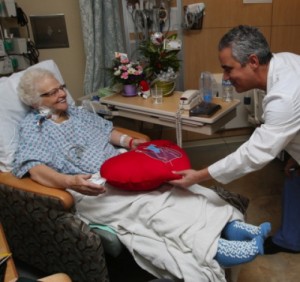
Dr. Ciuffo with heart surgery patient (Photo Credit: Karen Schiely/Akron Beacon Journal)
Many of the patients we see have been diagnosed as inoperable or high risk because of outside factors like age, frailty, or other diseases. Patients with factors prohibiting their heart surgery can receive a successful, life-saving surgery with our minimally invasive techniques. Saying to a high-risk heart patient that there is nothing that can be done to help can have devastating and terminal consequences, and a second opinion with Dr. Ciuffo can help save your life or the life of a loved one.
Minimally invasive procedures do not break ribs and include massive incisions that take many weeks or even months to heal completely. For many elderly and frail patients, traditional methods are simply not an option.
Second Opinion For Inoperable Heart Surgery
If you’ve been diagnosed as inoperable, please know that this is not final. Dr. Ciuffo works with many high-risk patients every day to create a minimally invasive surgical plan to save and extend their lives by many years. Some surgeons and doctors simply do not have the knowledge, expertise, or ability to perform minimally invasive surgeries.
When given an inoperable diagnosis, follow these steps:
1. ASK WHY
Ask your cardiologist exactly why they’ve given you this diagnosis and write down their answers.
2. ASK “WHAT ARE MY CHANCES?”
Ask the doctor what your chances are without surgery. Some surgeons fail to tell patients that not doing anything about the heart condition is much riskier than the surgery to fix it.
3. GET YOUR MEDICAL REPORTS
Request copies of all your medical reports and heart imaging studies, such as CAT scans, Echocardiograms, MRIs, etc.
4. CONTACT US
Dr. Ciuffo is an expert in high risk and inoperable heart surgery cases. He can evaluate your case and handle risk factors with our bloodless and minimally invasive techniques with excellent results, that are simply not available or not even known about at your local doctor’s office. Request your second opinion.
Don’t let an inoperable diagnosis resign you to a short and limited life. Dr. Ciuffo has helped many patients improve and extend their lives. Read their success stories and learn more about why you may have been diagnosed this way.

